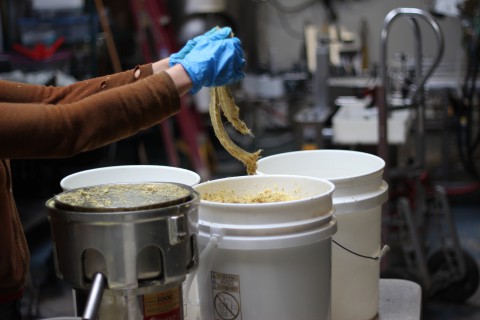If a big company comes along and wants to steamroll a smaller corporation with a buy- out, what options are there when corporations must maximize profits for shareholders? Does the smaller company have to sell, even if it means the death of its eco-friendly, socially conscious practices?
Maybe not, if the smaller company is a B-corp or benefit corporation. Both designations — the first certified by international nonprofit B Lab, and the second a designation offered by some states — give small companies options, particularly when the bottom line includes sustainable practices and philosophies, along with social and environmental goals.
This trend can be seen nationally, as well as in the Asheville area, the B-corp designation is being adopted by companies like New Earth Muziq, New Belgium Brewing Co. and Buchi Kombucha.
Stakeholders over shareholders
“Basically, the idea is about stakeholder values over shareholder values,” says Katie Kerr, B Lab’s communication director. “Your business impacts so many people around you, so we’re looking at a wider lens than just money in and money out.”
More than 950 corporations from 32 countries and 60 industries are “working together toward one unifying goal: to redefine success in business,” using the nonprofit’s standards of social and environmental performance, accountability and transparency, the nonprofit states on its website.
“You can be a profitable company but destroying the environment and the community around you … is not going to be a long-term value,” Kerr explains. “Look at what happened with Wall Street — they were focused on the short-term profit and the whole place collapsed.”
“A [music] venue is one of the most wasteful things in the world,” says Adrian Zelski of downtown Asheville’s nightclub New Earth Muziq, a certified B-corp. “You throw away an average of 100,000 [plastic] cups a year if you’re a small-size venue.”
But under B-corps’ alternative business model, companies look at the “triple bottom line” — the business’ sustainability through social, environmental and community impacts alongside profitability. The triple bottom line is opposed to the long- held business traditions that look strictly at profit when defining success.
The desire to reduce environmental impact was also important to New Belgium Brewing Co., another B-corp. “We have always considered the environment and our communities as shareholders in the business,” says Media Relations Director Bryan Simpson. “It makes sense that we would not want to be beholden to strictly a financial bottom line.”

A knowledgeable business
Benefit corporations are certified through B Labs’ “B Impact Assessment.” This tool asks questions tailored to a company’s size, sector and geography to measure impact in a variety of categories, including governance, employees, environmental impacts and community involvement, before giving a score out of 200 possible points. Any company with 80 points or above can take steps toward becoming a certified B-corp — though the process may take some time.
“Learning how to do that, to become a B-corp, was a big challenge,” Zelski says. “It was a monumental effort. It took about 18 months with two people working on it full time.”
A corporation does not have to meet or exceed all of B Lab’s suggestions to become a B-corp, however. Though B Lab encourages practices such as employee health care, maternity or paternity leave and living wages, not every business can do all of that and re- main sustainable.
“Don’t become a B-corp if you can’t. If you’re not sustainable, you’ll go out of business,” Zelski says. “But the idea is, if you can [adopt these changes] in any way, … you should, and it will better your company.”
Transparency and accountability make up a large part of the B-corp philosophy. Business owners seeking to become certified need to know exactly where all of their raw ingredients or products are coming from. They are expected to strive to source everything from sustainable, environmentally and socially conscious businesses — and to actively en- courage others to do the same.
Zane Adams is a worker-owner at Buchi Kombucha in Weaverville, another local company actively working toward certified B-corp status. Adams says she believes in the importance of following those supply lines.
“There are some companies that are doing it right, and they are amazing, and then there are some companies who are not necessarily telling you the truth,” Adams says. “We were getting sugar — this awesome organic sugar — and it turned out it was being distributed by one of the biggest groups proliferating GMOs,” she says.
That’s crucial information for getting assessed as a potential B-corp. B Lab may ask applicants questions such as, “Who provides your raw materials?” or “Do the raw materials providers have policies on wages or maternity leave?” Business owners seeking B-corp certification have to make a concentrated effort to know every part of their business. But being a B-Corp is not all about environmentalism or any single facet — it’s about becoming a more organized, more knowledgeable business.
“This isn’t some righteous cause that’s not going to work,” Zelski says. “There’s no end- game. That’s the fun part. You’re always trying to make it a little bit better.”
Creating a legacy
So far, 19 states and the District of Columbia have created laws recognizing benefit corporations. North Carolina is not one of them. In the states where B-corps are officially recognized, there are tax benefits to be gained, which Zelski says are similar to nonprofit organizations. But for now, in North Carolina, it’s all about the ideal.
“[B Lab] really has a big goal,” Zelski says. “They want to transform the economy. By the year 2020 they want everyone to ask themselves, ‘Why am I not a B-corp?’ They want people to ask, ‘Do I not want to pay a living wage? Do I want to outsource to China? Do I not want to give health benefits? Do I want to pull the wool over the eyes of the consumers?’ The goal is definitely to bring awareness.”
Kerr elaborates, “Our goal is to redefine success in business, so that all businesses compete to be not just best in the world, but best for the world. So we’re trying to reshape the way businesses and society look at what a company is and what they can do.”
Though not yet officially recognized in North Carolina, B-corps still offer a plus side for businesses. One of the biggest is that the certification helps protect the vision and integrity of smaller companies when larger, non-B-corp businesses buy them out.
“The biggest ‘pro’ is the ability to protect our values-based, mission-driven legacy as a 100 percent employee-owned company,”
Simpson said. “By registering as a B-corp, our trustee is legally protected should she decide to refuse an offer for purchase that holds financial gain for shareholders with- out upholding our commitment to co-workers, communities and the environment.”
Adams shares a similar view. “The changes that we make [to become a B-corp] are baked into the DNA of our operating agreement,” Adams says.
B Lab helps the company create a sort of mission statement and “declaration of interdependence.” As Adams explains it, “That means that if you want to come — Mr. Coca Cola or whatever — and buy my company, then you have to be a B-corp. You have to follow the rules. If you don’t follow the rules, you have to disband my company, cre- ate a new brand and start again.”
Zelski agrees, saying it was important to note that by becoming a B-corp, the company is less at risk of being derailed if someone new comes in and wants to shake things up. Once the B-corp ideals are part of the corporation, they are part of it forever — and that’s a good thing.
“I feel privileged to be a part of it,” he says.




Before you comment
The comments section is here to provide a platform for civil dialogue on the issues we face together as a local community. Xpress is committed to offering this platform for all voices, but when the tone of the discussion gets nasty or strays off topic, we believe many people choose not to participate. Xpress editors are determined to moderate comments to ensure a constructive interchange is maintained. All comments judged not to be in keeping with the spirit of civil discourse will be removed and repeat violators will be banned. See here for our terms of service. Thank you for being part of this effort to promote respectful discussion.